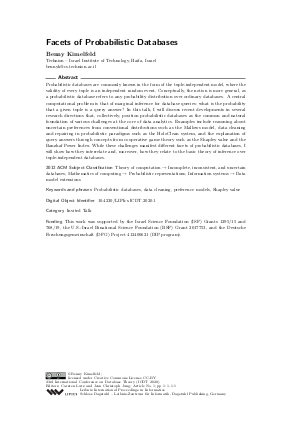Facets of Probabilistic Databases (Invited Talk)
Author Benny Kimelfeld
-
Part of:
Volume:
23rd International Conference on Database Theory (ICDT 2020)
Part of: Series: Leibniz International Proceedings in Informatics (LIPIcs)
Part of: Conference: International Conference on Database Theory (ICDT) - License:
 Creative Commons Attribution 3.0 Unported license
Creative Commons Attribution 3.0 Unported license
- Publication Date: 2020-03-11
File

PDF
LIPIcs.ICDT.2020.1.pdf
- Filesize: 158 kB
- 1 pages
Document Identifiers
Subject Classification
ACM Subject Classification
- Theory of computation → Incomplete, inconsistent, and uncertain databases
- Mathematics of computing → Probabilistic representations
- Information systems → Data model extensions
Keywords
- Probabilistic databases
- data cleaning
- preference models
- Shapley value
Metrics
- Access Statistics
-
Total Accesses (updated on a weekly basis)
0Document
0Metadata
Abstract
Probabilistic databases are commonly known in the form of the tuple-independent model, where the validity of every tuple is an independent random event. Conceptually, the notion is more general, as a probabilistic database refers to any probability distribution over ordinary databases. A central computational problem is that of marginal inference for database queries: what is the probability that a given tuple is a query answer? In this talk, I will discuss recent developments in several research directions that, collectively, position probabilistic databases as the common and natural foundation of various challenges at the core of data analytics. Examples include reasoning about uncertain preferences from conventional distributions such as the Mallows model, data cleaning and repairing in probabilistic paradigms such as the HoloClean system, and the explanation of query answers through concepts from cooperative game theory such as the Shapley value and the Banzhaf Power Index. While these challenges manifest different facets of probabilistic databases, I will show how they interrelate and, moreover, how they relate to the basic theory of inference over tuple-independent databases.
Cite As Get BibTex
Benny Kimelfeld. Facets of Probabilistic Databases (Invited Talk). In 23rd International Conference on Database Theory (ICDT 2020). Leibniz International Proceedings in Informatics (LIPIcs), Volume 155, p. 1:1, Schloss Dagstuhl – Leibniz-Zentrum für Informatik (2020)
https://doi.org/10.4230/LIPIcs.ICDT.2020.1
BibTex
@InProceedings{kimelfeld:LIPIcs.ICDT.2020.1,
author = {Kimelfeld, Benny},
title = {{Facets of Probabilistic Databases}},
booktitle = {23rd International Conference on Database Theory (ICDT 2020)},
pages = {1:1--1:1},
series = {Leibniz International Proceedings in Informatics (LIPIcs)},
ISBN = {978-3-95977-139-9},
ISSN = {1868-8969},
year = {2020},
volume = {155},
editor = {Lutz, Carsten and Jung, Jean Christoph},
publisher = {Schloss Dagstuhl -- Leibniz-Zentrum f{\"u}r Informatik},
address = {Dagstuhl, Germany},
URL = {https://drops.dagstuhl.de/entities/document/10.4230/LIPIcs.ICDT.2020.1},
URN = {urn:nbn:de:0030-drops-119258},
doi = {10.4230/LIPIcs.ICDT.2020.1},
annote = {Keywords: Probabilistic databases, data cleaning, preference models, Shapley value}
}
Author Details
Funding
This work was supported by the Israel Science Foundation (ISF) Grants 1295/15 and 768/19, the U.S.-Israel Binational Science Foundation (BSF) Grant 2017753, and the Deutsche Forschungsgemeinschaft (DFG) Project 412400621 (DIP program).
Supplementary Materials
- Video of the Presentation: https://doi.org/10.5446/46787
